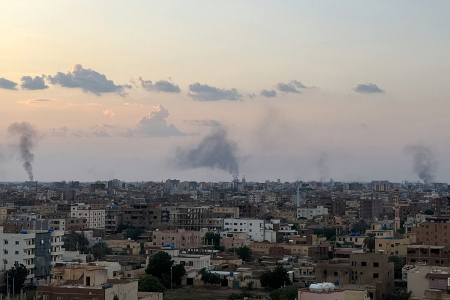Sudanese Christians among hardest hit by ongoing war

As the war in Sudan enters its second year with no clear resolution in sight, there are real fears that an escalation of hostilities between the Sudan Armed Forces and the Rapid Support Forces will further aggravate the humanitarian situation in Sudan.
Speaking to Christian Daily International, the General Secretary of the Sudan Evangelical Alliance, Rafat Samir, notes that Sudanese Christians have “long been ignored and neglected in humanitarian relief” increasing their vulnerability.
“Members of the Evangelical churches are not among the groups accepted by the two warring parties due to their political and ethnic differences,” said Samir, who suggested that Christianity is seen as a Western import with spy charges often used against Christians.
The Sudan Evangelical Alliance and local church leaders revealed critical shortages in food, clean water, medical supplies, and educational materials where most Christians were located — in the IDP camps and inside the war zones.
The Alliance has highlighted that the world’s attention has been focused on the conflicts in Ukraine and the Middle East while the crisis in Sudan has often been underreported.
Conflict, violence and displacement in Sudan has been a mainstay since the Darfur crisis in 2003. The country hosted 1 million refugees — the second highest refugee population in Africa — mostly coming from various conflicts in South Sudan and Tigray in Northern Ethiopia. After long-time Sudan ruler Omar al Bashir was ousted in 2019, there was some hope of a return to civilian rule, but the situation worsened instead. Amid the conflict, the country over the years has been impacted by severe weather conditions contributing to droughts and food insecurity.
Tom Perriello, the U.S. special envoy to Sudan, traveled to the African country for the first time on Nov. 18 to push for an increase in the flow of aid to millions of people in need and bring an end to the devastating war. The visit was seen by many as a possible catalyst to at least ensure access to aid.
According to a U.S. State Department statement, Perriello discussed "the need to cease fighting, enable unhindered humanitarian access, including through localized pauses in the fighting to allow for the delivery of emergency relief supplies, and commit to a civilian government."
On Nov. 22, the U.N.'s World Food Programme announced it had scaled-up its food aid operations across Sudan, reaching millions of people in the country’s most needy and isolated conflict areas. Over 700 trucks carrying about 17,500 tons of food were dispatched from the port of Sudan, enough to feed 1.5 million for a month.
WFP Regional Director for East Africa, Laurent Bukera, said the organization has been pushing to reach isolated conflict regions to “turn the tide of famine in one of the world’s worst hunger crises.”
Despite the inroads in the distribution of food, the U.N. says more than 25 million people are in dire need of aid in the country. The numbers are even more staggering when taking into account that the estimated population of Sudan is 50 million people.
“Sudan is, once again, becoming a nightmare of mass ethnic violence. The suffering is growing by the day, with almost 25 million people now requiring humanitarian assistance. They are enduring a nightmare of violence, hunger, collapsed infrastructure, displacement and extreme weather,” said António Guterres, U.N. secretary-general, in remarks to the U.N. Security Council in October.
The U.N. secretary-general further points out that Sudan is also the site of the largest displacement crisis in the world, with more than 11 million people fleeing since April last year. Noting that nearly 3 million have crossed into neighboring countries with thousands battling extreme weather and climate change impacts.
Reports suggest that Western actors, like mercenaries from the Sahel region — often holding anti-Christian sentiment — and others have joined the war, further worsening the situation the minority Christian community is likely to face.
However, in a move strongly condemned by the U.K. and U.S., Russia vetoed a draft U.K.-backed U.N. Security Council resolution calling for a ceasefire in Sudan on Nov. 11. Russia says the U.K. was interfering in Sudanese affairs without involving Sudan itself, while the British Foreign Secretary, David Lammy, termed the veto a "disgrace." All other 14 Security Council member states voted in favor of the draft, but the veto meant the resolution did not pass.
According to the World Watch list, an annual ranking of the 50 countries where Christians face the most extreme persecution, Sudan was a "good news story." Apostasy was no longer illegal, and more leniency around freedom of religion was brought in by the transitional government.
However, this year, Sudan has moved up several places on the World Watch List to No. 8, which is evidence that believers are now more vulnerable after the breakout of a civil war in April 2023.
This article was originally published at Christian Daily International
Christian Daily International provides biblical, factual and personal news, stories and perspectives from every region, focusing on religious freedom, holistic mission and other issues relevant for the global Church today.






















